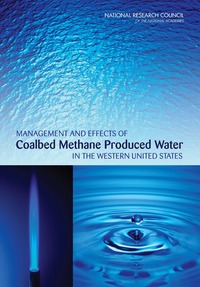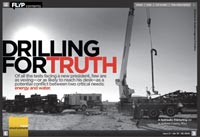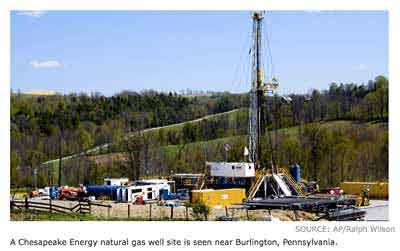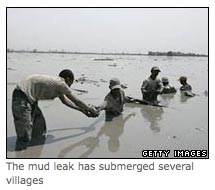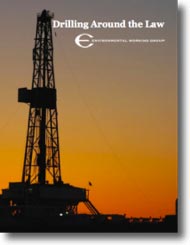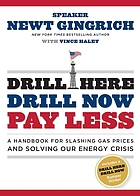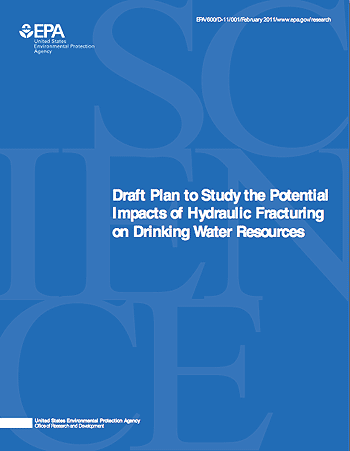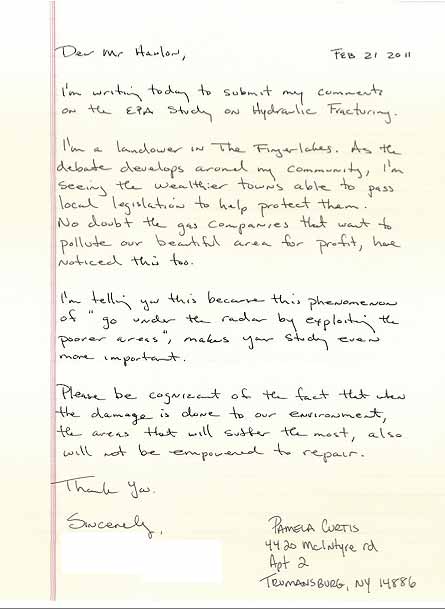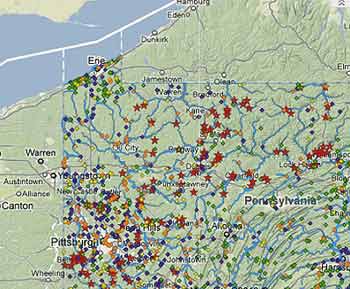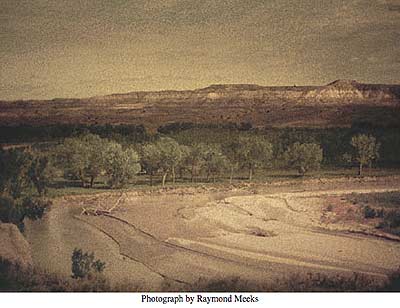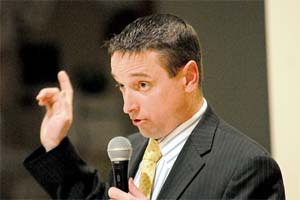Biblio
This booklet provides an introduction to drinking water issues. It draws from a body of independent, peer-reviewed expert consensus reports from the National Research Council to provide an overview of public water supply and demand, water management and conservation, options for the government and the private sector, and the economic and ecological
aspects of drinking water.
See the Division of Earth and Life Studies.
Key Finding
Authoring Organizations
Joaquin Sapien and Sabrina Shankman. December 29, 2009 ProPublica.
Environmentalists, state regulators and even energy companies agree that the problem most likely to slow natural gas drilling in the Marcellus Shale in New York is safely disposing of the billions of gallons of contaminated wastewater the industry will produce...
...Of the six injection wells that operate in New York, only one is licensed to accept oil and gas wastewater. It's owned by Lenape Resources Inc., which uses it exclusively for wastewater from its own gas fields [near Rochester, NY].
See: Do the natural gas industry’s surface water withdrawals pose a health risk?
It’s possible that there is $1 trillion worth of natural gas beneath the ground of Pennsylvania. With that kind of money at stake, out-of-state drilling companies are flocking to Pennsylvania and so are their lobbyists.
Use this site to find out which gas companies have been giving unlimited contributions to Pennsylvania politicians… and who's been taking them.
Common Cause Pennsylvania is a non-profit, non-partisan citizens' lobby organization. We are dedicated to restoring the core values of American democracy, reinventing an open, honest and accountable government that serves the public interest, and empowering ordinary people to make their voices heard in the political process.
We work to strengthen public participation and to ensure that the political process serves the public interest, rather than the special interest. Common Cause Pennsylvania conducted the data research available on this website as part of its "Deep Drilling, Deep Pockets" report, released in May of 2010.
Abrahm Lustgarten. Flypmedia. Issue 21. January 16-29, 2009. "Drilling for Truth". Page 11.
Includes photos, graphics and videos.
Experimental Flash based interactive online magazine. Last updated Fall 2009. On April 19, 2010, Flyp announced that it will close.
See: Drilling Wastewater Disposal Options in N.Y. Report Have Problems of Their Own - ProPublica
Download this brief (pdf)
A widely used oil-and-gas drilling technique, hydraulic fracturing, is spreading rapidly to develop vast reserves of natural gas trapped in deep underground shale formations.
Hydraulic fracking, however, is coming under more rigorous oversight by the press and state and federal agencies because of its contribution to air and water pollution.
This attention is welcome, both to ensure that health and safety will be protected if gas is to be more widely used as a cleaner replacement for coal in electric plants and foreign oil as a transportation fuel. We must also more accurately measure carbon dioxide and other pollution from the combustion of gas compared to coal and oil.
This issue brief explores the ecological and economic issues of “fracking,” as it is increasingly coming to be known in the areas of the country where natural gas is tapped due to the technology. Cutting to the chase, our conclusion is this—hydraulic fracturing needs to be done carefully and be well-monitored, with particular attention paid to the full scope of carbon dioxide released into our atmosphere to gauge accurately the consequences of global warming due to the expanded use of natural gas.
...Concerns about this technique led late last year to a partial moratorium in New York state on new drilling permits that allow fracking. Nationally, advocates want to repeal a 2005 congressional exemption of fracking from oversight under the Safe Drinking Water Act. Many activists also want to require drilling companies to publicly disclose the chemicals it uses, as other industries do under the Community Right to Know law. Industry historically resists such calls, though a number of companies have recently dropped their opposition, saying they will publicize the chemicals they use.
These natural gas operations also produce smog-forming pollutants, contributing to air pollution problems in places such as western Wyoming and the Fort Worth area. Indeed, natural gas wells produce so much air pollution that smog in the area around Pinedale, Wyoming is sometimes as bad as in Los Angeles. And these shale gas wells can release fugitive methane, which is a potent global warming pollutant.
In a recent investigation, for example, The New York Times reported on rivers and waterways that serve public water systems in Pennsylvania being contaminated with naturally occurring radioactive materials, such as radium, as a result of drilling activities. The series has also raised serious questions about the adequacy of oversight by state and federal agencies including the Environmental Protection Agency.
Tom Kenworthy is a Senior Fellow at the Center for American Progress who focuses on energy and environmental issues. Daniel J. Weiss is a Senior Fellow and Director of Climate Strategy at the Center. Lisbeth Kaufman is a Special Assistant with the Center’s Energy team, and Christina C. DiPasquale is Associate Director of Press Relations at the Center.
BBC. January 24, 2007. A mud flow that has displaced thousands of Indonesians was most probably caused by gas drilling, scientists say.
See: Davies, R. J, R. E Swarbrick, R. J Evans, and M. Huuse. 2007. "Birth of a mud volcano: East Java, 29 May 2006." GSA Today 17, no. 2: 4–9.
See below: Hardiyan Digwiyono. (2006). "Children in the Hot Mud Volcanoes". YouTube.
Watch the related videos that follow this one minute film.
Dusty Horwitt. (2009). "Drilling Around the Law Report." Environmental Working Group. 24 pages.
Contains extensive bibliography.
Companies that drill for natural gas and oil are skirting federal law and injecting toxic petroleum distillates into thousands of wells, threatening drinking water supplies from Pennsylvania to Wyoming. Federal and state regulators, meanwhile, largely look the other way.
--The mission of the Environmental Working Group (EWG) is to use the power of public information to protect public health and the environment. EWG is a 501(c)(3) non-profit organization, founded in 1993 by Ken Cook and Richard Wiles. Includes the EWG Action Fund, a 501(c)(4) organization that advocates on Capitol Hill for health-protective and subsidy-shifting policies.
From Magiric, Blog by South African freelance writer, Donald Paul.
Recently, the righteous voices of reason stepped into the fray regarding the use of hydraulic fracturing technology in prospecting for shale gas in the Karoo, One of the voices is journalist Ivo Vegter, who assumed the role of Devil’s advocate. Such a role requires a modicum of intellectual rigour otherwise you end up playing God’s advocate, endorsing that which you supposedly set out to question. It’s an easy back slide and reveals a penchant for controversy over a desire for coherency.
Lewis Pugh, a critic of environmental degradation and a spokesman for Treasure the Karoo Action Group (TKAG), challenged Shell—and other gas and oil companies—about its plan to frack in the Karoo and in so doing made a speech that was widely reprinted and replayed on various digital channels. For some it was rousing. For others, it was “propaganda” and “alarming”. The latter determined that what Pugh was saying was that there would be war over water...
The voices of reason fail to acknowledge the human rights dimension of this debate being more intent of disparaging—but not refuting—the arguments of those opposed to short-term corporate gains at the expense of the future...
The proponents of fracking cannot in any way show that fracking will not contaminate the Karoo aquifers. What they do say, repeatedly, is that there is “no known link” between fracking and aquifer and groundwater pollution. And they cite only their own expert testimony.
...The naivety continues. Vegter cited reams of outdated research regarding “signed statements from state officials representing Ohio, Pennsylvania, New Mexico, Alabama, and Texas, responding to these allegations [water contamination]. As a result of our regulatory review and analysis, the GWPC concluded that state oil and gas regulations are adequately designed to directly protect water resources”.
This is so staggeringly naive it’s unbelievable. It is also shoddy research. These legislators were making a political argument, not a scientific one—in other words, they were covering their backs. The reason why the USA’s Environmental Protection Agency (EPA) is re-opening the debate on the use of hydraulic fracturing—hearings are being conducted as this is being written—is because whistle-blowers within EPA confirmed that political pressure had been brought to bear on the original reports. As Wes Wilson, one of the E.P.A. whistle-blowers, said in a recent interview about that report, five of the seven members of the study’s peer review panel were current or former employees of the oil and gas industry.
Numerous complainants petitioned the USA government to get the EPA to review the earlier decision on hydraulic fracking. One of them, from Neil Zusman, Ithaca, NY, is particularly poignant:
I have read widely on this topic and it is of personal interest to me. I am not a scientist. I observe the events along the historical timeline that includes civil rights, anti-war protest, and the environmental movement....
Donald Paul is a freelance writer from South Africa.
See: Aragom Eloff. Ivo Vegter vs. the Fracking Fringe. 2011-04-18.
See: Julienned DuToit. Fracking the Karoo - The People Say No! 2011-01-31.
See: Lewis Pugh. Frack Off, Shell!. 2011-04-05
See: Robert Brand. South Africa Endorses Plans For Karoo Gas-Drill Freeze, Ending Shell Hopes - Bloomberg. 2011-04-21.
 EPA's Draft Hydraulic Fracturing Study Plan
EPA's Draft Hydraulic Fracturing Study Plan
 Science Advisory Board Public Comments Letters from the Public. March 7, 2011. Posted to Web.
Science Advisory Board Public Comments Letters from the Public. March 7, 2011. Posted to Web.
You can read all the form letters submitted from Texas, as well as my letter here:
| Public comment submitted to the SAB Staff Office | Public Comments submitted by Neil Zusman, Ithaca, NY-2-28-11. (PDF, 3 pp., 118,694 bytes) |
"The States have not shown that they can adequately regulate gas drilling, especially in more populated areas. Federal Regulations are clearly needed.
Time and time again, as noted by a Pew Research Group report, a wide variety of industries, in seat belts, lead paint, cigarettes and many others, have fought federal regulation only to have history prove that it never hurt their bottom line." (Neil Zusman, 2011-02-28).
See: Pew Environment Group (PEG) Factsheet: Industry Opposition to Government Regulation (PDF), October 14, 2010.
See: Letter from Thomas Curtis, AWW. Website below:
In summary, AWWA supports protecting of sources of drinking water under any and all circumstances, including hydraulic fracturing. We appreciate the agency’s consideration of our comments. If there are any questions about these comments, please direct them to Alan Roberson, AWWA, at (202) 326-6127.
Yours Sincerely,
Thomas W. Curtis Deputy Executive Director
See this hand-written letter by Pamela Curtis of Trumansburg, New York:
See: Federal Register: Science Advisory Board Staff Office; Notification of a Public Meeting of the Science Advisory Board Panel for the Review of EPA's Hydraulic Fracturing Study Plan. EPA Notice: 2/09/11.
The Environmental Protection Agency (EPA or Agency) Science Advisory Board (SAB) Staff Office announces a public face-to-face meeting of the SAB Panel to conduct an independent review of EPA's Draft Hydraulic Fracturing Study Plan.
The meeting will be held on March 7, 2011 from 9 a.m. to 5 p.m., and March 8, 2011 from 8 a.m. to 5 p.m. (Eastern Time).
The Panel meeting will be held at the Westin Alexandria Hotel located at 400 Courthouse Square, Alexandria, VA 22314.
Members of the public can submit comments for a federal advisory committee to consider as it develops advice for EPA. They should send their comments directly to the Designated Federal Officer for the relevant advisory committee.
Oral Statements: In general, individuals or groups requesting an oral presentation at this public meeting will be limited to five minutes per speaker. Interested parties should contact Mr. Edward Hanlon, DFO, in writing (preferably via e-mail), at the contact information noted above, by February 28, 2011 to be placed on the list of public speakers for the meeting.
Written Statements:
Written statements should be received in the SAB Staff Office by February 28, 2011 so that the information may be made available to the SAB Hydraulic Fracturing Study Plan Review Panel for their consideration.
In its Fiscal Year 2010 budget report, the U.S. House of Representatives Appropriation Conference Committee identified the need for a focused study of this topic. EPA scientists, under this administration and at the direction of Congress, are undertaking a study of this practice to better understand any potential impacts of hydraulic fracturing on drinking water and groundwater. EPA consulted with experts in the field through peer review, and technical workshops and engaged stakeholders in a dialogue about the study through facilitated public meetings.
EPA has submitted its draft study plan on hydraulic fracturing for review to the agency's Science Advisory Board (SAB).
The overall purpose of the study is to understand the relationship between hydraulic fracturing and drinking water resources. The scope of the proposed research includes the full lifespan of water in hydraulic fracturing, from acquisition of the water, through the mixing of chemicals and actual fracturing, to the post-fracturing stage, including the management of flowback and produced water and its ultimate treatment and disposal.
The SAB plans to review the draft plan March 7-8, 2011. Consistent with the operating procedures of the SAB, an opportunity will be provided for stakeholders and the public to provide comments to the SAB during their review. The Agency will revise the study plan in response to the SAB's comments and promptly begin the study. Initial research results are expected by the end of 2012 with a goal for a report in 2014.
See: Industry responds to public take on hydraulic fracturing | Fracking Resource Guide
See: EPA Hydraulic Fracturing Study Plan Review Panel
See: Lisa P. Jackson, EPA (lisapjackson) on Twitter
See: U.S. Congress. Committee on Space, Science, and Technology. "Hearing Highlights Lack of Objectivity in Draft EPA Fracking Study--No Evidence of Drinking Water Contamination from Fracking, Witnesses Say". May 11, 2011
If You Give Up, They Give Up - Stop Global Warming.
A dark, moody animation that children may not like to watch. A monkey, polar bear and kangaroo kill themselves because their world is ruined. TV Spot created by McCann Erickson Portugal for Quercus - National Association for Nature Conservation.
Produced by Seagulls Fly São Paulo.
See: The Tragedy of the Commons
See: Global Warming
See: Global Warming Frequently Asked Questions
See: Polar Bears (video)
See: Train (video)
See: Futurism Now (blog)
In 2004, the Political Economy Research Institute ranked Dominion Resources 27th among corporations emitting airborne pollutants in the United States, the second highest rating behind Duke Energy.
Dominion has a web page citing its ecosystem conservation efforts and contributions. It earned $15 billion in 2009. Its main ecosystem project received funding of $500,000 in 2009.
Dominion operates the nation's largest natural gas storage facility with 975 billion cubic feet of storage capacity and serves retail energy customers in 12 states.
For this company's information resources on non-conventional production from coal bed methane and Marcellus shale gas, see the web page, Appalachian Gateway Project.
Includes Landowner's Rights, Source of Supplies, Project Schedule, Environmental Considerations.
Created Sep 15, 2010 by Kyle Ferrar
This map shows the multitude of surface water withdrawals in Pennsylvania that are permitted by the PA DEP. The many points exemplify the magnitude that the PA community and economy relies on the quality of our surface water resources. The red stars show the oil and natural gas industry withdrawal locations.
Click to see more details on this map.
The current water management practices of the natural gas industry during the regional dry season are likely to have contributed to higher TDS concentration in the Monongahela River...
...the water withdrawals in the Monongahela River watershed are potentially causing a cumulative impact on flow volume in the river that magnifies all forms of pollution by increasing the pollutant concentrations. Much more research needs to be conducted on this issue, to ensure safe and sustainable permitting practices for water withdrawals.
See: Urbina, Ian. “Regulation Is Lax for Water From Gas Wells.” The New York Times 26 Feb. 2011. Web. 27 Feb. 2011.
See: With Natural Gas Drilling Boom, Pennsylvania Faces an Onslaught of Wastewater
See: WATER: Gas drilling in huge Appalachia reserve yields foul, briny byproduct - AP
Powder Keg
The gas industry has been busy in Wyoming's prairies and grasslands, building thousands of miles of roads and sinking more than 10,000 wells in the past three years. But in the Powder River basin, ranchers are joining environmentalists to try to still the drills.
See: C-Span Book TV Oct. 2, 2004. Bushwacked: Life in George W. Bush's America. Chapter: "Dick, Dubya, and Wyoming Methane." (152)
The Mayor of tiny Dish, Texas, north of Fort Worth, continues to stir up controversy with his claims of air pollution from oil and gas activities causing health concerns in his community. The mayor appeared at the RRC's January 12 open hearing. You can watch his testimony here (go to item 17 on the agenda).
The mayor's appearance was prompted by an item placed on the agenda by Commissioner Michael Williams, which in turn had been prompted by a letter sent to the Commissioners by State Rep. Ron Burnam. Rep. Burnam's letter asked the RRC to place a moratorium on permits for wells in the Barnett Shale around Fort Worth until the Texas Commission on Environmental Quality (TCEQ) has finished its investigation of air quality in the area.
In response, Commissioner Williams proposed that the Commissioners write a letter to the Texas Attorney General asking for a formal opinion whether the RRC has authority to issue such a moratorium. (Rep. Burnam has also asked the City of Fort Worth to issue a similar moratorium on well permits in the city limits.) I have written about the controversy concerning the town of Dish in a previous post.
John McFarland is a shareholder at Graves, Dougherty, Hearon & Moody in Austin Texas specializing in representation of landowners and mineral owners in oil and gas matters in Texas.
See: Health Issues Follow Natural Gas Drilling In Texas
See: How Should We Do the Mountain?: Who the heck is Calvin Tilman?








